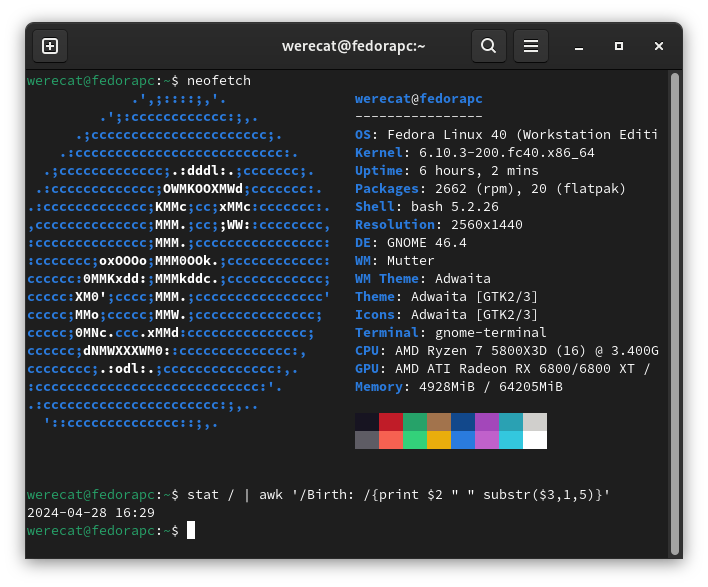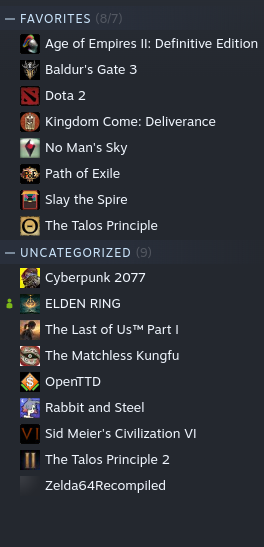I've tried to switch multiple times and always found or encountered some issue that got me back to Windows (on desktop PC).
Last year it was after 2 months on Fedora 38 KDE when I had enough with the KDE Window Manager acting weird and broken unusable VRR on desktop and some other smaller but daily issues that I went back to W11 on my PC.
I like GNOME over KDE and back then there was no VRR support on GNOME so I only had to stick with KDE, now it's a different story.

I still have some minor annoyance which are probably solvable but I don't know how as I didn't put enough effort in finding solution.
Namely:
1.) Sometimes my 2nd monitor after boot remains blank and I have to unplug and plug back in the DP cable from the graphics card. Typically happens after a kernel update or restart but rarely on cold boot. I've seen others having this issue on Fedora40 but I haven't seen any solution mentioned.
2.) Steam UI hangs up sometimes for several seconds when trying to navigate fast trough it and especially if it needs to pop a different window.
3.) GPU VRAM OC is completely busted and even doing +-1MHz will result in massive artifacting even on desktop, not a big deal but I would take the extra 5% boost I can have from VRAM OC on Windows :)
4.) After every Kernel update I have to run two commands to get my GPU overclock to work again. I haven't figured out yet how to make a scrip that can read output from 1st command and copy it into 2nd command so I just do it manually every time which is roughly once a week.
5.) Free scrolling does not work in Chromium based browsers :( Luckily Vivaldi has some nice workaround with mouse gestures but I would still like free scrolling like on Windows.
And these are about the only annoyance I found worthwhile to mention.
Gaming works fine.

The apps I use typically work fine on Linux as well. Mangohud is amazing. No issues with audio unlike my last experience. Heck even Discord has no issues streaming video and audio now despite just using the web app. VRR despite being experimental works flawlessly on GNOME for me. I'm happy.
RX 6800 XT
1.) I don't think it's a driver issue. For some reason the display just does not get picked up during boot. The system still behaves like there are 2 monitors connected though.
2.) Tried disabling HW acceleration in Steam, so far so good but haven't used it for long enough to see if it's completely fine.
3.) AMD changes VRAM timings with clock, it's not just simple clock change, thats why also negative offset affects VRAM stability. I don't think that CoreCTRL compensates for this with it's VRAM tune.
Any system logs that might be related to the display not being detected properly?
Since you're using AMD graphics, you're using the open source drivers right? The proprietary AMD drivers are not good.
Did some looking around and what I found is it could be a sign that the cable is starting to fail:
https://askubuntu.com/questions/1118738/whats-the-likely-cause-of-a-get-monitor-geometry-assertion
Do you have another cable you could try?
It could also be a bug in Gnome, since you said it only happens after something like a kernel update. I wonder if it would happen if you used a live usb of gnome, and if so, would it happen if you used a live usb of KDE or some other desktop manager.
I'm 100% sure it's not a cable issue for many different valid reasons one of the main ones being that the cable is able to drive higher res monitor at higher refresh rate without issue.
Also if I just swap cables from my main monitor with the 2nd the same issue still happens with the 2nd monitor but only in Linux, never Windows.
Makes sense. Well, best of luck with it. That's super annoying, sorry I couldn't help. If you do figure it out and remember this, I would love to know what the answer was!
Yes, I'm using the FOSS drivers. I'll try to look at the logs next time it happens